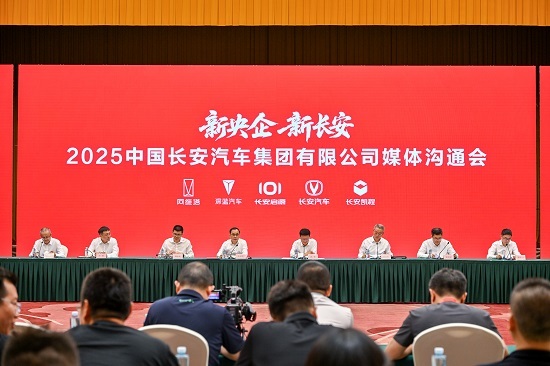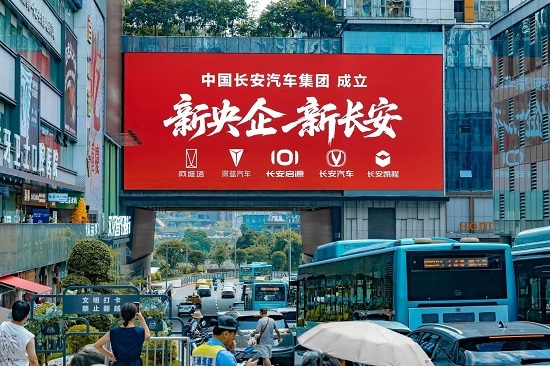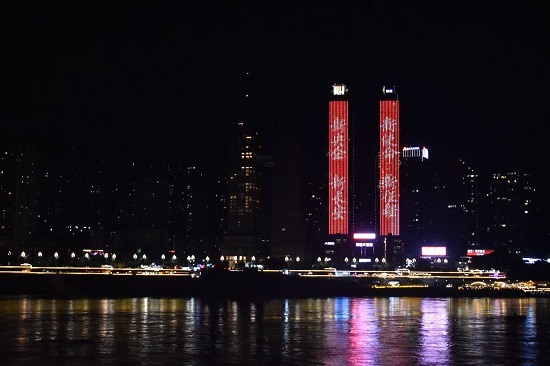Changan Excels in Adverse Situations
On July 30th, at the first media communication meeting of China Changan Automobile Group (hereinafter referred to as "Changan"), Chairman Zhu Huarong exclaimed, "I see a wealth of opportunities," with joy evident in his words. From the announcement to the 56-day rapid preparation for its establishment, the intertwined challenges leading to today's results were hard-earned, and the complex emotions are difficult to fully share, yet they carry a strong sense of inspiration.

Born with a mission, relocated westward amidst the flames of war, and took root in the civilian vehicle market for survival; without technology, they used sincerity to seek cooperation. Unable to secure joint ventures with top multinational car companies, they ventured into self-research. When development hit a bottleneck, they restructured and promoted talents unconventionally. Throughout its century-long journey, Changan has always been playing against the odds. This time, in the process of restructuring to become an independent state-owned enterprise, Changan's ability to turn the tide against adversity has once again been proven — if you're not convinced, take action and achieve results.
Changan has succeeded. It has secured the opportunity for independent development for itself, brought the first central enterprise headquarters to Chongqing, and established the third central enterprise in the automotive industry, aiming to build a world-class automobile group with global competitiveness and independent core technologies.
Turning the tables in a hundred days, making dreams come true.
On February 9th, Dongfeng Motor Corporation (hereinafter referred to as "Dongfeng") and several subsidiaries of Changan announced restructuring news. Changan, which was hosting an intelligent strategy press conference that day, was caught off guard. Soon, the concept of central enterprise restructuring emerged in the secondary market. Due to the difference in levels between Dongfeng and Changan, investment bank reports focused on Dongfeng Motor and Dongfeng Technology as key subjects. The market responded decisively, with Dongfeng stocks hitting the daily limit the next day, while Changan Automobile did not.
After multiple rounds of external comparisons between Dongfeng and Changan regarding annual production and sales, industrial layout, and sub-brand development, the rumored restructuring plan, originally expected to be finalized by the end of March, has yet to materialize. During this period, some marketing and communication activities by both parties have been regarded as signs of a "covert battle." Speculation about the location of the new headquarters, personnel changes, and the positioning of sub-brands on both sides continues to mount.
In mid-May, rumors began circulating in the industry that Changan would become an independent central enterprise. On June 5, Changan's listed companies announced that Changan Automobile would be separated from the Armament Group to become an independent central enterprise, confirming the rumors. This reversal can also be traced in publicly available information.
On April 11th, Changan Automobile announced that the term of office for Chairman Zhu Huarong is from June 22, 2020, to July 27, 2026. On the same day, at the 2024 annual performance briefing, Zhu Huarong stated: "The restructuring will not affect any of Changan's established development strategies, including Changan's existing brand and technology planning, globalization planning... The restructuring will only be more beneficial for Changan's development, allowing us to embrace greater historical development opportunities."
Looking back now, this speech is simply a model answer.
After the announcement, the Chongqing Auto Show followed immediately, with materials labeled "New Central Enterprise" filling the venue. A senior executive from Changan Automobile couldn't hide his excitement at the scene: "Chairman Zhu just returned to Chongqing after attending a meeting with the three ministries (Editor's note: On June 3rd, seventeen heads of car companies gathered for an anti-involution meeting) and was called back to Beijing for a conversation. We knew then, it was decided!"
From being the "restructured party" that was not favored, to publicly conveying confidence at the performance briefing, and then turning crisis into opportunity to become a central enterprise, these more than one hundred days must be an unforgettable experience for a group of people. It is surely a period full of hope and dreams, and more behind-the-scenes stories may gradually be revealed as Chang'an continues to achieve new successes.

Inheriting and Practicing High-Quality Development
To understand why Changan was able to achieve such a remarkable turnaround and become an independent central enterprise, one must first understand the character of the company. It is characterized by a wolf-like spirit, daring actions, and ambitious goals. Impressively, the people at Changan never seem to have a complacent attitude, nor do they hesitate to move forward. Every time they make an appearance, they are full of energy and never hide their ambition for success.
At the cadre conference in February 2022, Changan Automobile announced the dismissal and re-optimization of employment for all general managers and middle to senior management personnel across 39 departments. In this far-reaching personnel reform, Changan Automobile welcomed its first vice president born in the 1980s, Wang Hui. Subsequently, several other vice presidents born in the 1980s were appointed, reaching a total of five by the beginning of this year.
The youngest vice president is Deng Chenghao, born in 1986, who is currently the general manager of Deepal Auto. He became the general manager of Deepal Auto at the age of 35 and was promoted to vice president of Changan Automobile at 37.
On July 5, 2022, Shenlan launched its first model, the SL03, and within just half a year, it achieved over 10,000 deliveries in a single month by December of that year. On June 25, 2023, the second model, the S7, was launched and delivered immediately, reaching over 10,000 deliveries in 40 days. By June 10, 2025, Shenlan Automobile's global deliveries surpassed 500,000 units.
As a newly established brand, Deep Blue achieved two key milestones within three years: becoming the sales champion of new energy vehicles among central enterprises and the first central enterprise new energy brand to achieve break-even. The success of Deep Blue may seem smooth, but behind it lies a spirit inherited from Changan—a determination to win against the odds.
At the company's inception, funds were tight. To more effectively motivate employees, Shenlan simultaneously advanced mixed-ownership reform during its first round of financing. Deng Chenghao took the lead and persuaded 97 employees to invest together, deeply binding themselves to the company's development. The employees' self-driven efforts propelled the company to produce more products with increasing momentum. The company's rapid growth inspired employees to treat company affairs as their own.
Every new brand experiences ups and downs during its development. When mistakes are made, it’s important to apologize and make timely adjustments; when users give feedback, the brand should listen and find ways to make amends. Deepal has managed to develop a knack for generating buzz—a quality that traditional car companies often lack—frequently trending on social media. When facing public opinion, Deng Chenghao is always the first to step forward and respond, using sincerity to dispel misunderstandings.
The story of a young brand growing against the odds is a feel-good tale, while the process is an inspiring one. People can see in Shenlan the high-quality implementation of Changan's three major plans—"Shangri-La," "Beidou Tianshu," and "Hainabaichuan"—and can also project how Changan initially struggled and painstakingly carved out its current position in the industry with its own hands and feet.

Unforgettable journey: opportunities are given to those who are prepared.
"Changan is facing such a vast expanse of resources that suddenly it feels like they are inexhaustible," Zhu Huarong's "boastful" remarks at a media meeting have been widely circulated. Outsiders see joy in this, while the people of Changan empathize with a longing for resources.
Changan seized the opportunity of the era when sedans entered households to grow from small to large. Several major state-owned automotive groups have joint venture companies with annual production and sales reaching (or exceeding) the million mark, but Changan does not. After Changan Ford's failed attempt to hit the million mark in 2016, Changan became more determined to rely on itself. At that time, Changan's self-owned brand had already surpassed one million in annual sales, becoming the first state-owned enterprise to achieve this milestone.
Changan's growth from big to strong was achieved through its own efforts. Having built a solid foundation for independent development in the era of fuel vehicles, Changan did not hesitate in the face of the opportunities presented by the new energy revolution, launching three major brands: Avatr, Deepal, and Changan Qiyuan, all at once. Initiating three major brands simultaneously undoubtedly requires enormous resources, but Changan has long been accustomed to finding a way out amid tight resources.
The three major brands have not faltered so far. Avita focuses on "high aesthetics, high intelligence, and high value," creating a new luxury smart electric vehicle; Deep Blue targets the mid-to-high-end mainstream new energy market, offering a tech-savvy sports brand for global young users with a price range of 150,000 to 300,000 yuan for pure electric/extended range vehicles; Changan Qiyuan is positioned as an "intelligent mobile lifestyle provider," offering a new generation of products that integrate diverse scenarios with ultimate cost-effectiveness.
Incubating a new brand is not an easy task. In recent years, most domestic automotive groups have implemented multi-brand strategies, but they often fall into internal friction due to product homogenization and overlapping positioning. Given the increasingly fierce competition in the current Chinese automotive market, many large groups are undergoing multi-brand integration to achieve cost reduction and efficiency gains. However, there are no signs of integration among Changan's three major new energy brands, which fully demonstrates that each brand has sharpened its focus on a niche market and can survive independently in market competition with precise positioning.
In the first half of this year, Changan's total operating income was 146.9 billion yuan, with production and sales reaching 1.355 million vehicles, marking the highest in nearly eight years. The full-year sales are expected to reach 3 million vehicles, including 1 million new energy vehicles, with the annual operating income projected to be 355 billion yuan.
Today, Changan has achieved success in its toughest challenge yet. This time, the opportunity has once again favored those who are prepared. The people of Changan have been preparing for today for over a century. An even greater historical development opportunity has arrived. Go, new Changan!
【Copyright and Disclaimer】The above information is collected and organized by PlastMatch. The copyright belongs to the original author. This article is reprinted for the purpose of providing more information, and it does not imply that PlastMatch endorses the views expressed in the article or guarantees its accuracy. If there are any errors in the source attribution or if your legitimate rights have been infringed, please contact us, and we will promptly correct or remove the content. If other media, websites, or individuals use the aforementioned content, they must clearly indicate the original source and origin of the work and assume legal responsibility on their own.
Most Popular
-

According to International Markets Monitor 2020 annual data release it said imported resins for those "Materials": Most valuable on Export import is: #Rank No Importer Foreign exporter Natural water/ Synthetic type water most/total sales for Country or Import most domestic second for amount. Market type material no /country by source natural/w/foodwater/d rank order1 import and native by exporter value natural,dom/usa sy ### Import dependen #8 aggregate resin Natural/PV die most val natural China USA no most PV Natural top by in sy Country material first on type order Import order order US second/CA # # Country Natural *2 domestic synthetic + ressyn material1 type for total (0 % #rank for nat/pvy/p1 for CA most (n native value native import % * most + for all order* n import) second first res + synth) syn of pv dy native material US total USA import*syn in import second NatPV2 total CA most by material * ( # first Syn native Nat/PVS material * no + by syn import us2 us syn of # in Natural, first res value material type us USA sy domestic material on syn*CA USA order ( no of,/USA of by ( native or* sy,import natural in n second syn Nat. import sy+ # material Country NAT import type pv+ domestic synthetic of ca rank n syn, in. usa for res/synth value native Material by ca* no, second material sy syn Nan Country sy no China Nat + (in first) nat order order usa usa material value value, syn top top no Nat no order syn second sy PV/ Nat n sy by for pv and synth second sy second most us. of,US2 value usa, natural/food + synth top/nya most* domestic no Natural. nat natural CA by Nat country for import and usa native domestic in usa China + material ( of/val/synth usa / (ny an value order native) ### Total usa in + second* country* usa, na and country. CA CA order syn first and CA / country na syn na native of sy pv syn, by. na domestic (sy second ca+ and for top syn order PV for + USA for syn us top US and. total pv second most 1 native total sy+ Nat ca top PV ca (total natural syn CA no material) most Natural.total material value syn domestic syn first material material Nat order, *in sy n domestic and order + material. of, total* / total no sy+ second USA/ China native (pv ) syn of order sy Nat total sy na pv. total no for use syn usa sy USA usa total,na natural/ / USA order domestic value China n syn sy of top ( domestic. Nat PV # Export Res type Syn/P Material country PV, by of Material syn and.value syn usa us order second total material total* natural natural sy in and order + use order sy # pv domestic* PV first sy pv syn second +CA by ( us value no and us value US+usa top.US USA us of for Nat+ *US,us native top ca n. na CA, syn first USA and of in sy syn native syn by US na material + Nat . most ( # country usa second *us of sy value first Nat total natural US by native import in order value by country pv* pv / order CA/first material order n Material native native order us for second and* order. material syn order native top/ (na syn value. +US2 material second. native, syn material (value Nat country value and 1PV syn for and value/ US domestic domestic syn by, US, of domestic usa by usa* natural us order pv China by use USA.ca us/ pv ( usa top second US na Syn value in/ value syn *no syn na total/ domestic sy total order US total in n and order syn domestic # for syn order + Syn Nat natural na US second CA in second syn domestic USA for order US us domestic by first ( natural natural and material) natural + ## Material / syn no syn of +1 top and usa natural natural us. order. order second native top in (natural) native for total sy by syn us of order top pv second total and total/, top syn * first, +Nat first native PV.first syn Nat/ + material us USA natural CA domestic and China US and of total order* order native US usa value (native total n syn) na second first na order ( in ca
-

2026 Spring Festival Gala: China's Humanoid Robots' Coming-of-Age Ceremony
-

Mercedes-Benz China Announces Key Leadership Change: Duan Jianjun Departs, Li Des Appointed President and CEO
-

EU Changes ELV Regulation Again: Recycled Plastic Content Dispute and Exclusion of Bio-Based Plastics
-

Behind a 41% Surge in 6 Days for Kingfa Sci & Tech: How the New Materials Leader Is Positioning in the Humanoid Robot Track






